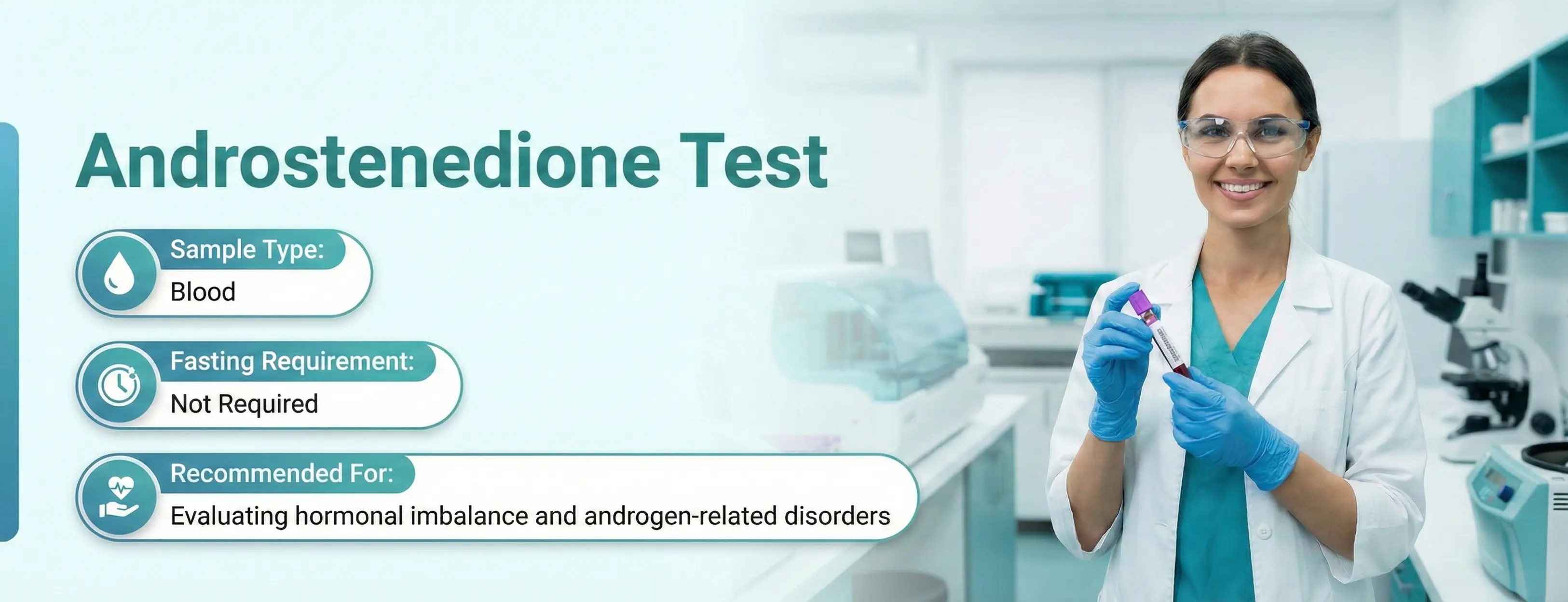17+ orders placed in your location
100% NABL & ISO Certified Lab • 100% Accurate Reports
Androstenedione Test
AD Test, 4-Androstenedione Test, 4-Androstene-3.17-dione Test, Delta-4-Androstenedione Test, FAI test
- SummaryThe Androstenedione test measures the level of androstenedione, a steroid hormone involved in the production of testosterone and estrogen. It helps assess adrenal and gonadal function and diagnose conditions like polycystic ovary syndrome (PCOS), adrenal tumours,or early puberty. The test is done using a blood sample, and fasting is usually not required, though your doctor may advise it depending on other tests.Read more
- Reports Within24 HrsView Sample Report100% NABL & ISO Certified Labs
- SampleBlood
- AgeAll Age Group
- GenderMale and Female
- FastingNot Required
PharmEasy Promises
Know More About The Test
A quick info on Androstenedione Test
Overview
Androgens are a group of sex hormones that play a major role in male traits and reproductive activity. Androgens may be called male hormones but are present and produced in males and females in different amounts. The two principal androgens are testosterone and androstenedione.
Androstenedione is a weak androgen steroid hormone. It is a messenger of testosterone and other androgens. It also has weak androgenic activity in its own right. It has been found to maintain some estrogenic activity, similarly to other DHEA metabolites. Also, it is used as a supplement to increase muscle strength.
An androstenedione test measures the functioning of the adrenal gland and the production of androgen hormones in women. As the adrenal gland majorly produces androstenedione, the test helps detect and diagnose related diseases like adrenal tumours and cancers. It also helps determine the cause of male physical characteristics (virilization) in females or early puberty in boys.
A doctor may prescribe an androstenedione test to find symptoms in men like an enlarged penis, muscle growth, pubic hair and symptoms in women like infertility, excess facial or body hair, irregular periods, hair growth, male pattern baldness, etc.
Abnormal or high androstenedione test levels may cause mild to severe health complications like an adrenal tumour, adrenal cancer, adrenal hyperplasia or congenital adrenal hyperplasia. In contrast, low levels of Androstenedione may indicate adrenal insufficiency or a decline in ovarian or testicular function.
Risk Assessment
Adrenal Tumour, Adrenal Cancer, Adrenal Insufficiency, PCOS, Erectile Dysfunction
What does this test detect?
High and low levels of androstenedione in the blood can cause health problems or issues. The test measures the amount of androstenedione present in the blood.
Indications for androstenedione Test
Your doctor may recommend the androstenedione test if they want to evaluate a person's adrenal gland, ovarian or testicular function or if one has any symptoms depending on their gender.
Symptoms in men can include:
- Enlargement of external genitalia (penis)
- Muscularity
- Excessive pubic hair
- A deepness in the voice
- Delayed puberty
- Premature puberty
Symptoms in women can include:
- Infertility
- Lack of menstruation
- Male pattern baldness
- Muscularity
- Growth of excess facial or body hair
- Deeper voice
- Acne
- Irregular menstruation
The test is also suggested when a young female develops male physical characteristics or when the external sexual organs of a female infant are not male or female.
Androstenedione is ordered occasionally to help in monitoring glucocorticoid cold replacement therapy for CAH.
In the case of abnormal levels of androstenedione in the blood or adrenal dysfunction, a physician, endocrinologist or gynaecologist should be consulted for further treatment. A doctor may also recommend a repetitive Androstenedione Test for three months.
To treat abnormal Androstenedione levels in the blood, your doctor may prescribe anti-androgen drugs, including spironolactone, CPA and flutamide. Sometimes you may be suggested oral contraceptives.
How frequently should you take this test?
The presence of abnormal levels or amounts of androstenedione in the blood can cause several health complications. If the previous androstenedione test results are abnormal, your doctor may recommend a repetitive test every three months.
A doctor may suggest you have this test annually if the symptoms are recurrent and the last test results were normal.
Test Preparation
Before the Test
Typically, no special preparations are required for an androstenedione test. However, if you are undergoing this test alongside another one, your healthcare provider may advise you on specific dietary restrictions. It's always best to consult with your doctor before the test for personalised guidance.
During the Test
The blood sample will be drawn from a vein in your arm. Here's what you can anticipate during the test:
- The area where the needle will be inserted will be cleaned with an antiseptic.
- A tourniquet band will be placed around your arm to make the veins easier to locate.
- A quick pinch may be felt as the needle is inserted into the vein to draw the blood. This process typically takes a few seconds.
- The collected blood will be stored in a vial or a small test tube labelled with your test details.
After the Test
Once the blood is collected:
- An adhesive plaster will be placed over the puncture site to prevent bleeding.
- Mild bruising may occur, feeling dizzy is less common. You might be advised to rest for a few minutes.
- Consult with your healthcare provider if you experience bleeding, pain, or rashes at the puncture site.
Parameters
The androstenedione test results measure the amount or level of the androstenedione hormone (type of androgen hormone) in the blood. It helps diagnose adrenal tumours or cancer or dysfunction of the adrenal gland. It aids in determining the cause of male physical characteristics in females or early puberty in boys.
Abnormal results of the androstenedione test may cause health complications in both men and women.
Ranges
The androstenedione test ranges in men can vary with their age. Ranges can be in two different units, conventional or standard.
- The normal range in men aged 18-30 years is 50-220 ng/dL or 175-768 nmol/L
- The normal range in men aged 31-50 years is 40-190 ng/dL or 140-663 nmol/L
- The normal range in men aged 51-60 years is 50-220 ng/dL or 175-768 nmol/L
The androstenedione test ranges in women can vary with their menstrual cycle.
- The normal range in women in the follicular phase is 35-250 ng/dL or 122-873 nmol/L
- For women in the mid-cycle, the normal range is 60-285 ng/dL or 209-995 nmol/L
- The normal range in women in the luteal phase is 30-235 ng/dL or 105-820 nmol/L
The normal values and reference ranges of the test may vary from lab to lab. Please refer to the ranges mentioned in the report and consult a doctor to understand the interpretation of lab reports.
Test Result Interpretation
High levels of Androstenedione Test in males can cause:
- Adrenal tumours: Adrenal tumours are cancerous or noncancerous growths on the adrenal glands. They can cause the glands to produce elevated levels of hormones, resulting in high blood pressure, rapid heart rate, headache, sweating, etc.
- Cardiovascular diseases: The conditions generally related to the heart include diseased vessels, structural problems and blood clots. They might cause heart failure or chronic heart disease.
- Adrenal hyperplasia: A genetic disorder in which a group of genetic conditions limits hormone production in the adrenal glands, such as androstenedione hormone. It results from the deficiency of one of the five enzymes required to synthesise cortisol in the adrenal cortex.
Low level of Androstenedione test in males can cause:
- Decreased sex drive: Loss of libido (sex drive) is a common problem that affects many men with lower androstenedione hormone levels in their bodies. The condition can also happen because of stress or tiredness.
- Erectile dysfunction: Erectile dysfunction can signify a physical or psychological condition in which a man can't get or keep an erection firm enough for sexual intercourse. It can cause stress, relationship strain and low self-confidence.
High levels of Androstenedione in females can cause:
- Clitoral enlargement: It is an abnormal enlargement of the clitoris. It may be congenital or acquired, most often due to exposure to an excess of androstenedione in fetal life, infancy or adolescence. The condition is also called Clitoromegaly or macroclitoris.
- Amenorrhea: The condition of absence of monthly menstrual periods in women. The absence of periods can occur with abnormal androstenedione hormones.
- Hirsutism: An unwanted condition of male-pattern hair growth on a woman's face, chest and back. Hirsutism can result from excess male hormones, called Androstenedione. One may inherit it from their parents as well.
- Infertility: A common condition in females is the inability to get pregnant and have a successful pregnancy. Infertility is typically diagnosed after a woman has tried to get pregnant (through unprotected sex) for 12 months without a pregnancy.
Low levels of Androstenedione in females can cause:
- Sarcopenia: Loss of muscle mass caused by low levels of androstenedione hormone in females. This decrease in muscle leads to a reduction in strength. As a result, balance and gait are also affected.
- Polycystic Ovarian Syndrome: A diseased condition in which an imbalance of hormones causes enlarged ovaries with small cysts on the outer edges. It may also cause acne and obesity.
Risks and Limitations
The androstenedione test is a standard blood test that is generally safe and does not commonly result in complications. However, kindly contact your physician immediately if you encounter:
- Persistent bleeding from the needle insertion site.
- Pain or swelling at the site of blood collection.
Limitations of the test
- Possibility of errors caused by equipment or human factors.
- Risk of misinterpretation of the test markers.
Was This Test Information Helpful?
Please rate your experience
References
People Also Ask
What is Androstenedione used for?
How long does an Androstenedione test take?
How do you know if you have excess androgens?
Is Androstenedione testosterone?
How do you test androgen levels?
Have any doubts? Ask us.
Ask us anything about the Androstenedione Test to understand it better
We provide trusted, expert-curated health content to support better awareness,prevention, and care.
Backed by experienced doctors, medical experts, and strict editorial standards.


